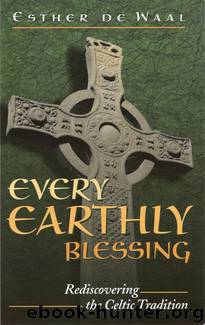EVERY EARTHLY BLESSING by ESTHER DE WAAL

Author:ESTHER DE WAAL
Language: eng
Format: epub
Publisher: Church Publishing Incorporated
Published: 2010-03-21T16:00:00+00:00
Common Creation
“THE LORD is indeed good to me,” exclaims the hermit as he sits with his open book under a hedge of trees, and listens to the birds.
The chanting of birds I hear—
Good to draw man’s tears:
Each of them answers the other:
Does not the whole Church do so?
In this poem, which is dated to about the year 806, the writer is clearly conversant with the times of the year at which the birds begin to sing, and he sees them as singing the responses and joining in the canonical hours with him.
The birds of the world, power without ill,
come to welcome the sun,
On January’s nones, at different hours,
The cry of the host from the dark wood.
On the eighth calends of noble April
The swallows come on their pure tryst,
(Till they depart)
on the eighth calends of October.
On the festival of Ciaran, son of the carpenter,
Wild geese come over the cold sea,
On the festival of Cyprian, a great counsel,
The brown stag bells from the ruddy field.
Melodious music the birds perform
to the King of the heaven of the clouds,
Praising the radiant King
Hark from afar the choir of the birds.1
“Understand, if you want to know the Creator, created things.” When St. Columbanus said this he was speaking out of his own experience. The integration of humankind with the birds and the animals as part of a common creation was something the Celtic world not only grasped intellectually and effectively but also lived out as well. Jonas, the biographer of St. Columbanus, tells how during his periods of fasting and prayer in solitary places, the saint would call the beasts and the birds to him as he walked, and how they would come straightaway, rejoicing and gambolling around him in great delight would behave “like little puppies around their master.” He would summon a squirrel from the tree tops and let it climb all over him, and from time to time its head might be seen peeping through the folds of his robes. On one occasion when twelve wolves came up to him he stood still, motionless and fearless, repeating a verse of the psalm “O God be not far from me” until, after sniffing at his garments, they went peacefully away. Even the bears respected him, and so gentle was he that his gentleness communicated itself to them and they obeyed him. One bear was persuaded by him to leave its cave so that he could make it his hermitage; another, which was preparing to eat a dead stag, left it so that St. Columbanus could have the hide as leather for his monks. On another occasion the brothers, getting ready to pick the plums, found a bear already there and it seemed as though nothing would be left for them, but St. Columbanus decided that they must be shared, one part for the bear and the other for the monks.2
Bears and wolves, animals that in most cultures would be hunted down without pity, are here shown warmth and gentleness by these men of prayer, and the animals respond in kind.
Download
This site does not store any files on its server. We only index and link to content provided by other sites. Please contact the content providers to delete copyright contents if any and email us, we'll remove relevant links or contents immediately.
| Clergy | Devotionals |
| Faith | Inspirational |
| Meditations | Monasticism & Asceticism |
| Prayer | Prayerbooks |
| Ritual | Sermons |
The Secret Power of Speaking God's Word by Joyce Meyer(3218)
More Language of Letting Go: 366 New Daily Meditations by Melody Beattie(3029)
The Holy Spirit by Billy Graham(2952)
To Light a Sacred Flame by Silver RavenWolf(2823)
Tuesdays With Morrie by Mitch Albom(2762)
The Lost Art of Good Conversation by Sakyong Mipham(2654)
The Traveler's Gift by Andy Andrews(2461)
Kundalini by Gopi Krishna(2184)
A Kingsbury Collection by Karen Kingsbury(2105)
Anxious for Nothing by Max Lucado(1975)
Angels of God: The Bible, the Church and the Heavenly Hosts by Mike Aquilina(1969)
Finding Chika by Mitch Albom(1968)
Angels by Billy Graham(1926)
As a Man Thinketh by James Allen(1902)
The Yoga of Jesus: Understanding the Hidden Teachings of the Gospels by Paramahansa Yogananda(1862)
Curse Tablets and Binding Spells from the Ancient World by Gager John G.;(1861)
Autobiography of a Yogi (Complete Edition) by Yogananda Paramahansa(1826)
Barking to the Choir by Gregory Boyle(1821)
How To Be Born Again by Billy Graham(1781)
